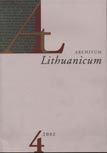Bûdvardžiu su priesaga -iškas(-a) posesyvinës reikšmës statusas senuosiuose raštuose
The status of the possesive meaning of adjectives with the suffinx -iškas(a) in old Lithuanian texts
Author(s): Saulius AmbrazasSubject(s): Theoretical Linguistics, Syntax, Lexis, Historical Linguistics, Lithuanian Literature
Published by: Lietuvių Kalbos Institutas
Keywords: Old Lithuanian texts; 16th-17th century; adjectives; syntax; suffix; Translations;
Summary/Abstract: Most Old Lithuanian texts of the 16th-17th centuries are translations. Their syntax and lexicon were under the heavy influence of the originals. A similar problem with regard to the influence of the originals sometimes occurs in investigations of word formation too. In Old Lithuanian texts adjectives with the suffix -iðkas(-a) usually have a possessive meaning and are encountered side by side with the adnominal genitive, cf. the example from Ewangelie Polskie y Litewskie (1647) by Jonas Jaknavièius: Iey ieºmes (abä iemiá=ºkus) dayktus µaki=ºan iumus / a teãiau ne tikite / kaypog iey µakiãia iumus dungiákus tikieµite 17120-26. Such usage is not characteristic of modern Lithuanian where derivatives of this type usually denote resemblance. Therefore Pranas Skardþius (1943) and some other investigators were inclined to see the influence of the Slavonic languages in the possessive usage of adjectives with the suffixe -iðkas(-a) in Old Lithuanian texts.
Journal: Archivum Lithuanicum
- Issue Year: 2002
- Issue No: 04
- Page Range: 159-170
- Page Count: 12
- Language: Lithuanian

